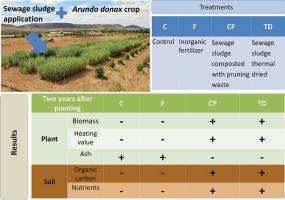Industrial Crops and Products ( IF 5.9 ) Pub Date : 2021-06-08 , DOI: 10.1016/j.indcrop.2021.113702 J. Cano-Ruiz , A. Plaza , P. Pinilla , P.V. Mauri , M.C. Lobo

|
Non-food crops provide an alternative renewable energy source. The high yield of Arundo donax makes this crop a suitable candidate for this purpose. Sewage sludge can be repurposed as an organic amendment to recover soil fertility and improve crop yield. This study sought to evaluate the effect of treated sewage sludge (SS) amendment on the production and heating value of A. donax as a source of biomass for energy production. The study was developed in experimental plots in Central Spain. As organic amendment, sewage sludge composted with pruning waste (CP) and treated by thermal drying (TD) were applied at a dose of 50 t ha−1, in comparison to a mineral fertilizer treatment (F) and a control soil without treatment (C). After two growing seasons, plant biomass, production parameters and heating value were examined, as well as the effect of the amendments on soil properties. Most parameters increased in plants grown in sewage sludge-treated plots, including heating value reaching 19.19 MJ kg−1. Moreover, the leaves of these plants had a higher chlorophyll (from 0.39 to 0.52 mg cm−2) and nitrogen content (2%) and a lower ash content (0.9 % reduction). This reduction in ash and the increase of heating value favor the use of this biomass for thermochemical applications. Moreover, the increase in soil organic carbon (around 40 %) due to the organic treatments contributes to increase the carbon stock in soil. The findings support that the application of treated sewage sludge emerges as a suitable strategy not only for enhancing the production of A. donax for energy uses but also for maintaining soil fertility in Mediterranean conditions.
中文翻译:

在田间试验中为芦竹生产处理污水污泥的价值
非粮食作物提供了一种替代的可再生能源。Arundo donax的高产量使这种作物成为此目的的合适候选者。污水污泥可以重新用作有机改良剂,以恢复土壤肥力并提高作物产量。本研究旨在评估经过处理的污水污泥 (SS) 改良剂对芦竹作为能源生产生物质来源的生产和热值的影响。该研究是在西班牙中部的试验田中进行的。作为有机改良剂,用修剪废物 (CP) 堆肥并通过热干燥 (TD) 处理的污水污泥以 50 t ha -1的剂量施用,与矿物肥料处理 (F) 和未经处理的对照土壤 (C) 相比。在两个生长季节之后,检查了植物生物量、生产参数和热值,以及改良剂对土壤特性的影响。大多数参数在污水污泥处理地块中生长的植物中增加,包括热值达到 19.19 MJ kg -1。此外,这些植物的叶子具有更高的叶绿素(从 0.39 到 0.52 mg cm -2) 和氮含量 (2%) 以及较低的灰分含量(减少 0.9%)。灰分的减少和热值的增加有利于将这种生物质用于热化学应用。此外,有机处理导致土壤有机碳的增加(约 40%)有助于增加土壤中的碳储量。研究结果支持处理后的污水污泥的应用成为一种合适的策略,不仅可以提高用于能源用途的芦荟产量,还可以保持地中海条件下的土壤肥力。



























 京公网安备 11010802027423号
京公网安备 11010802027423号